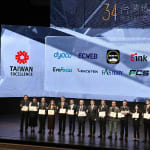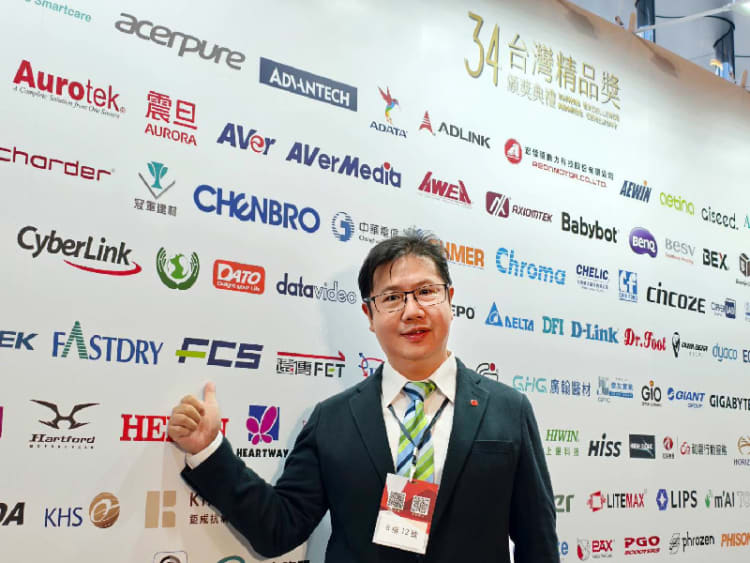
Fu Chun Shin (FCS Group) has received a Taiwan Excellence Award for its SA-160 intelligent outward toggle injection molding machine. The award was presented during the 34th Taiwan Excellence Award Ceremony held on 26 November in Taipei, where R&D manager Chiu Kuan-Chih represented the company. The event brought together enterprises recognized for innovation and manufacturing capability. FCS attracted particular attention with the SA Series, which combines smart control functions, energy efficiency measures and high-precision molding performance aimed at a wide range of plastic processing applications.
The Taiwan Excellence Award, organized by TAITRA under the guidance of the Ministry of Economic Affairs, assesses products against criteria including design, performance, innovative value and market potential. The recognition of the SA Series underlines its positioning as a solution focused on efficiency, process stability and sustainability for smart molding environments. The machines target medium to large applications and are designed for diversified sectors, from food packaging and consumer goods to industrial logistics and automotive components.
Key technical features of the SA Series
The SA Series intelligent outward toggle injection molding machines are designed as high-performance systems for medium to large applications. They integrate a full servo closed-loop injection system, a high-rigidity clamp structure and options for digital integration, including energy and carbon footprint monitoring.
Injection performance and process stability
According to FCS, the SA Series uses a full servo closed-loop injection system that achieves injection time stability greater than 99.9%. High shot-weight repeatability is intended to support consistent process quality in series production. A high-mixing screw design combined with linear guides is used to promote uniform plasticizing and to reduce mechanical wear in the injection unit. These characteristics are aimed at thin-wall molding and the manufacture of high-repeatability precision parts.
Clamping system and mold accommodation
The machines employ an outward toggle clamping system in which the clamping force is applied directly to the center of the platen. This configuration is intended to provide uniform mold loading and to reduce platen deflection, which can contribute to improved part quality and yield. Compared with earlier designs, the mold opening stroke has been increased by 18%, which enhances the machine’s compatibility with deeper molds used in large or complex components.
Machine footprint and structural optimization
The clamp unit of the SA Series has been shortened by 23%. This reduction in clamp length decreases the overall machine footprint, making the series suitable for production environments with limited floor space. The compactness is also intended to support more flexible equipment layouts and can contribute to higher overall factory space utilization.
iMF 4.0 smart manufacturing integration
As an option, SA Series machines can be connected to the iMF 4.0 smart manufacturing system. This enables real-time monitoring of injection, clamping, energy consumption and cycle data. Additional modules are available for tracking energy usage and carbon footprint, supporting users who are implementing energy optimization strategies or broader smart factory management systems.
Application sectors for the SA Series
The combination of speed, precision and structural rigidity has led to adoption of the SA Series in several application areas. In food packaging, the machines are used for thin-wall containers, beverage caps and sealing components, where short cycles and consistent wall thickness are crucial. In consumer plastics, typical products include storage boxes, daily-use items and other fast-cycle articles.
In industrial logistics, the machines are applied to the production of large pallets and turnover crates, where part dimensions, weight and mechanical strength are key. The series is also used for engineering plastic parts such as tool cases and reinforced components. In the automotive sector, SA machines are employed for cooling system parts and structural elements that must meet elevated requirements for rigidity and dimensional stability.

Case studies: large pallets and automotive components
Two application examples illustrate the capabilities of the SA Series in large product molding and in processing engineering plastics for automotive components.
Case 1: SA-3200 for 14 kg pallets made of PE
At a customer production site, the SA-3200 outward toggle injection machine is used to produce pallets weighing 14 kg. The machine’s high clamping force and stable injection performance support the required structural strength, durability and surface quality for these large parts.
The molding setup for this application includes a screw diameter of 240 mm and a single-cavity, large-area mold. The reported cycle time is 150 seconds. The process aims to ensure uniform plasticizing and complete cavity filling for the thick and extended geometry. These characteristics make the configuration suitable for medium to large logistics pallets and agricultural crates that demand high load capacity and consistent performance in service.

Case 2: SA-300 for automotive water tank components (PP+GF30)
The second example concerns the production of automotive water tank components made from PP+GF30, a polypropylene compound with 30% glass fiber content. Such parts require high injection pressure for proper filling of the reinforced material, good flow behavior and robust clamping rigidity to avoid deformation and to control warpage.
In this case, an SA-300 outward toggle model is used for stable production of the structural component. The molded part measures 265 × 135 × 105 mm, with a wall thickness of 6 mm and a part weight of 288 g. The reported injection speed is 130 mm/s and the total cycle time is 100 seconds. The process is characterized by complete cavity filling and reduced warpage, which is critical for sealing and dimensional requirements in automotive cooling systems.
According to FCS, this application demonstrates the suitability of the SA Series for engineering plastics and automotive-grade parts. The technology is applicable to components in automotive cooling systems, auxiliary structures, small structural elements and other heat-resistant reinforced engineering parts.
Market deployment and outlook
Since its introduction, the SA Series has gained momentum in the global market. FCS reports sales of 270 units in the current year. During major trade fairs, including K Show in Germany, DMP in China and PRI in Indonesia, SA Series machines accounted for more than 60% of the company’s on-site orders. This share indicates significant interest across regions in outward toggle technology that combines compactness, process stability and options for smart manufacturing integration.
FCS states that it will continue to develop smart molding technologies, energy-saving solutions and equipment innovations intended to help customers establish production lines with higher efficiency, stability and sustainability. In particular, the company positions the SA Series as part of a broader approach to data-driven manufacturing and resource-efficient plastics processing.



